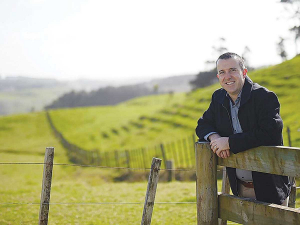Open Country opens butter plant
When American retail giant Cosco came to audit Open Country Dairy’s new butter plant at the Waharoa site and give the green light to supply their American stores, they allowed themselves a week for the exercise.
 As countries gradually get on top of Covid and the global economy rebounds in the coming years, dairy demand will firm up, says Nathan Penny, Westpac.
As countries gradually get on top of Covid and the global economy rebounds in the coming years, dairy demand will firm up, says Nathan Penny, Westpac.
Demand for dairy will firm over the next two years as the global economy rebounds from Covid, says Westpac senior agri economist Nathan Penny.
He notes that the trend has already started in China and East Asia where demand has rebounded from its lows earlier in the year.
Westpac has announced a 2021-22 initial opening forecast of $7/kgMS. The forecast is equal to its forecast for 2020-21 and close to the $7.14/kgMS final price achieved in 2019-20.
“Our forecast is higher than the long-run average milk price, although the difference is smaller when the prices are adjusted for inflation,” says Penny.
A key change that Penny expects is that demand and prices for milk fat will begin to normalise.
Currently, milk fat prices are soft as consumers eat less cream and other milk fat products in settings such as restaurants.
“In particular, we expect that the rollout globally of Covid vaccines will gradually allow more people to return to restaurants and other venues that milk fat consumption relies on,” says Penny.
He expects moderate growth in the key exporting countries over the next two years.
“Over recent years, annual growth has averaged in the vicinity of 1%.
“This relatively modest growth is another reason why prices have held up well during the global Covid recession.
“Moreover, we see a low probability that global supply will deviate materially from these trends by enough to offset the impact on prices from rising demand.”
However, there are a few “forecast risks”, including the New Zealand dollar and the possibility that dairy buyers run down stocks after having built them up during Covid to protect against supply disruptions.
“We note that there is a risk that, if the New Zealand economy’s resilience continues to surprise and local interest rates rise, then the NZD/USD could rise beyond what we have assumed.
“In this event, the milk price would be lower.”
There is also uncertainty around global agricultural trade policy.
Penny says Joe Biden’s US presidency may take a more trade and China-friendly stance, thus allowing the US more access to China’s market and thus more competition for New Zealand dairy exports.
“Finally, we assume normal weather conditions going forward. In the case of a NZ drought, global dairy prices are likely rise.”
Donald Trump's latest tariff tantrum has again thrown the world of trade into a new round of turmoil and uncertainty, and NZ is caught up in it.
The third edition of the NZ Dairy Expo, held in mid-February in Matamata, has shown that the KISS principle (keep it simple stupid) was getting a positive response from exhibitors and visitors alike.
Twenty years ago, South African dairy farm manager Louis Vandenberg was sent to a farm in Waikato to provide training on Afimilk technology.
Strong farmgate milk price is helping boost investment on farms, says PGG Wrightson chief executive Stephen Guerin.
Fonterra's 460 milk suppliers in Australia, who will switch to Lactalis end of this month, are unfazed with the impending change.
The 5+ A Day Charitable Trust has launched a collection of affordable recipes designed to turn everyday vegetables into seasonal stars.
OPINION: Is it a case of over promising and under delivering? Farmers think so.
OPINION: The UK dairy industry is celebrating a win after plant-based drink maker Oatly lost a long-running legal battle over…